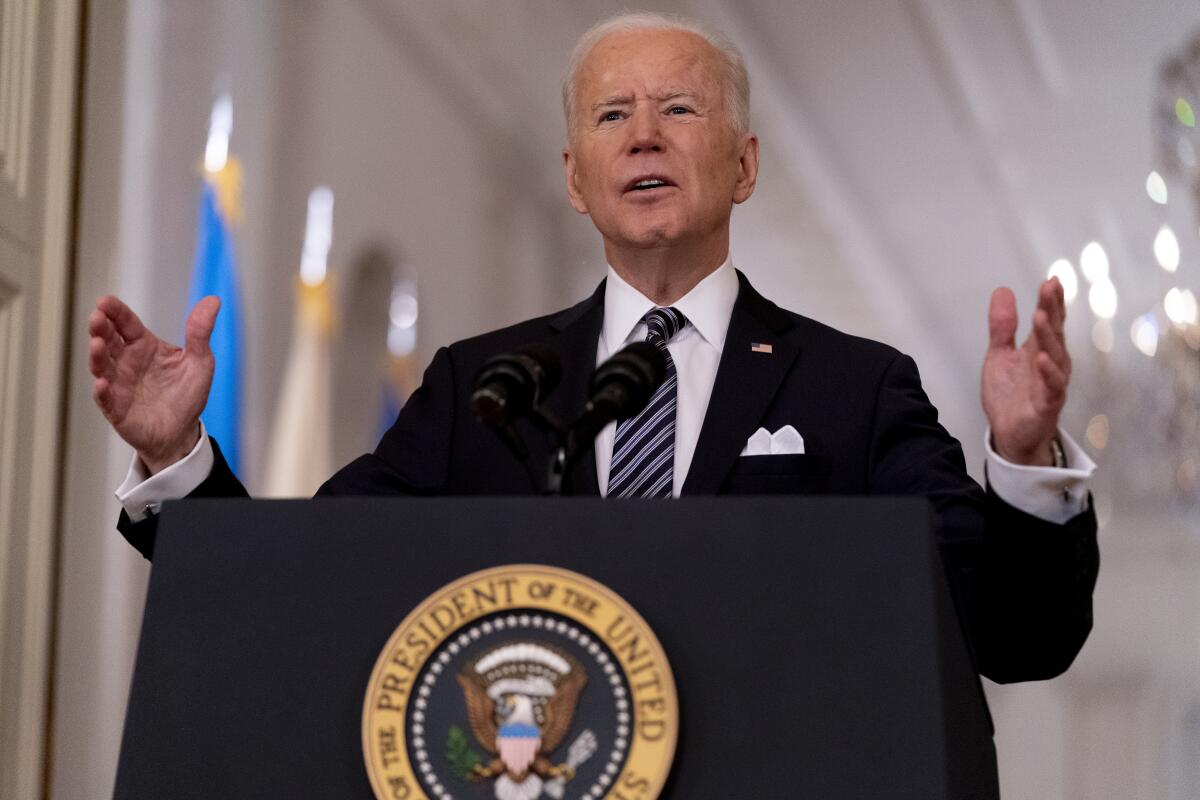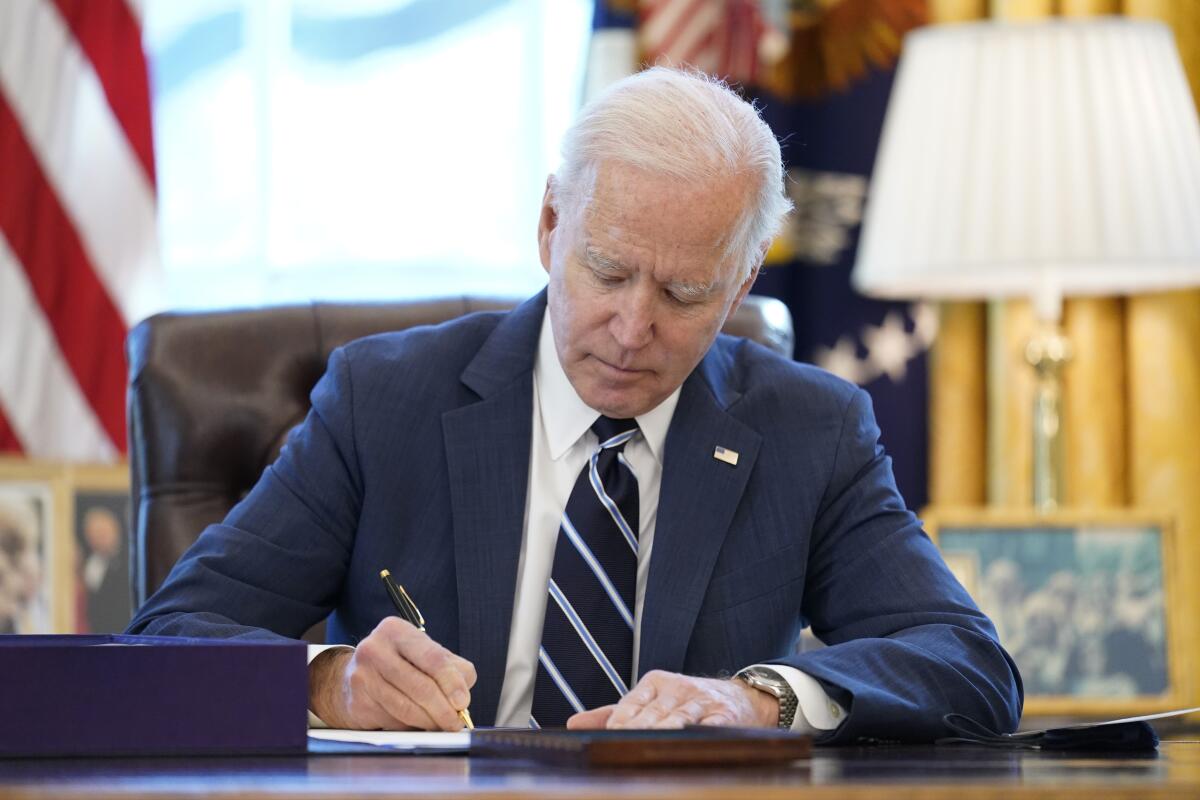Essential Politics: With Cabinet picks and poverty policy, Biden wins over progressives

WASHINGTON — This is the March 12, 2021, edition of the Essential Politics newsletter. Like what you’re reading? Sign up to get it in your inbox three times a week.
President Biden will likely never generate the sort of fervent support among progressives that Sen. Bernie Sanders (I-Vt.) receives, but just over 50 days into his administration, his relations with the party’s left are surprisingly strong.
The two sides have had one significant dispute so far, after Biden decided to go along with a procedural ruling that kept a $15 minimum wage out of the $1.9-trillion COVID relief package.
Progressives put pressure on Biden and Vice President Kamala Harris over that issue, and have also differed with the administration over relief for student loans. But much of their anger has flowed toward more moderate Democratic senators who opposed the minimum wage hike, especially Sens. Joe Manchin III of West Virginia and Kyrsten Sinema of Arizona.
The relief package itself has drawn strongly favorable reactions from progressives, notably for its expected impact on poverty: The Urban Institute, a Washington think tank, estimates that the measure, which Biden signed into law on Thursday, will reduce the number of Americans living in poverty by one-third. That would be one of the largest one-year declines in poverty in U.S. history.
Get our L.A. Times Politics newsletter
The latest news, analysis and insights from our politics team.
You may occasionally receive promotional content from the Los Angeles Times.
Biden has also gotten praise from the left for several of his recent appointments to high-level White House and sub-Cabinet positions, including Tim Wu, a Columbia University law professor known for his strong critiques of big tech, named to the National Economic Council; and Lily Batchelder, a New York University law professor best known for her work on more effective ways to tax inherited wealth, who will fill a key slot as assistant Treasury secretary for tax policy.
Biden is also reportedly planning to name another leading critic of big tech, Lina Khan, also a Columbia faculty member, to the Federal Trade Commission.
How much the views of those appointees will shape policy remains to be seen, but the party’s progressive wing has been increasingly reassured about having prominent seats at the table.
Democrats in array
All last year, as Biden consolidated his position as the Democrats’ leader, political operatives and the journalists who talk with them shared a common belief: Opposition to President Trump would hold the party together, but once he departed the scene, unity would go, too.
That may yet happen, but so far, the predicted disarray has not arrived.
That’s a notable difference between Biden’s experience and the early going of the last two Democratic administrations. Chaotic squabbles with congressional Democrats punctuated President Clinton’s first months in office and plagued much of his first term. And President Obama, despite large Democratic majorities in Congress, had consistent problems with conservative Democrats seeking to water down his proposals.
The difference reflects, in part, the overall shift to the left within the party, which has resulted in a more ideologically unified group of legislators. It also reflects the keen instinct Biden and his top advisers have for knowing what’s truly key for each of the party’s factions.
The result: Biden has enjoyed unified support within his party in these early months. The latest figures from the nonpartisan Pew Research Center, for example, show Democrats and Democratic-leaning independents approving of Biden’s job performance, 86%-11%. That’s a slightly larger degree of party unity than Trump had at this early stage of his presidency and matches Obama’s party support.
By contrast with the continued unity on the Democratic side, Republican lawmakers have taken several different paths. Although they unanimously opposed the $1.9-trillion American Rescue Plan, their divergence comes through in the votes GOP senators have cast on Biden’s Cabinet nominees.
One group, including such senators as Josh Hawley of Missouri, Ted Cruz of Texas, Tom Cotton of Arkansas and Rick Scott of Florida, have opposed nearly all of Biden’s nominees. Hawley has voted yes on only one of the 16 approved so far — Cecilia Rouse to head the White House Council of Economic Advisors.
In all, 13 Republican senators have voted no 10 or more times, according to a tally by political science professor Charles Franklin of Marquette University.
At the other end of the scale, four GOP senators — Susan Collins of Maine, Lisa Murkowski of Alaska, Mitt Romney of Utah and Rob Portman of Ohio — have voted in favor of all Biden’s nominees to date.
Another 13 have voted no on only four or fewer nominees.
The largest group, 20 Republicans, have voted no five to nine times.
Ideology has some relationship with how senators voted, Franklin noted, but the correlation isn’t very strong. The clearer dividing line separates those whose attentions focus on the Senate versus those whose ambitions run toward higher office.
The group that has seldom opposed a Biden nominee, for example, includes Senate Republican leader Mitch McConnell of Kentucky, along with several senior Republican senators who have either announced their plans to retire or who are almost surely at the end of their careers.
The Republican senators who have taken steps toward running for president have all voted against nearly all Biden’s nominees.
What do these opening days suggest about the next chapter?
Over time, the oft-predicted fracture in relations between Biden and the Democratic progressives could emerge. The administration and Democratic leaders will have difficult decisions on how to move ahead not just with the minimum wage proposal, which they’ve promised to continue to pursue, but bills to protect the rights of LGBTQ Americans, crack down on police abuses, more stringently regulate firearms and, perhaps most important, expand and protect voting rights.
The House has passed bills on each of those topics, but in the Senate, they have a tough path. In pursuing them, Democrats will repeatedly confront whether to change or eliminate the filibuster rules, which allow a minority to block measures the majority supports.
That issue divides Democrats, with Manchin and others saying they oppose any move to wipe out filibusters.
At this stage, however, Republicans remain more seriously split than Democrats.
Biden ran to the right of the other major candidates in the Democratic primaries, and when he won the nomination, political analysts said his ability to maintain a strong working relationship with the left would pose a key, early test.
On that measure, with his first major legislative battle behind him, it’s fair to say he’s exceeded expectations.

Cabinet filling up
Atty. Gen. Merrick Garland took the oath of office Thursday evening after winning Senate confirmation. The Senate also confirmed former Rep. Marcia L. Fudge of Ohio to head the Department of Housing and Urban Development and Michael S. Regan to head the EPA.
Those three bring the number of confirmed Cabinet members to 16, with a few more, including California Atty. Gen. Xavier Becerra, Biden’s nominee to head Health and Human Services, queued up for later this month.
And if you need a quick refresher, we’ve prepared this rundown on Biden’s Cabinet members and nominees.
Enjoying this newsletter? Consider subscribing to the Los Angeles Times
Your support helps us deliver the news that matters most. Become a subscriber.
Projecting hope on COVID
In his first prime-time speech from the White House, Biden projected hope about the COVID-19 pandemic. All American adults should be able to get at least their first vaccination shot by the end of May, officials said.
The speech came after the House gave final approval to the $1.9-trillion relief bill, and Biden signed it into law on Thursday afternoon.
Republicans call the bill a “liberal wish list.” Increasingly, Democrats are owning that. Lawmakers and party strategists see the bill as both good policy and good politics, noting its high approval ratings in polls.
But that early win could be hard to repeat, Eli Stokols and Chris Megerian wrote.
Trouble on the border
As was widely predicted, the number of unaccompanied children reaching the southwestern border has continued to grow, creating both a logistical and a political problem for the new administration.
As Molly O’Toole wrote, the administration plans to restart a program allowing some Central American children to join parents in the U.S. legally, by applying in their home countries.
Biden also plans to increase aid to help combat poverty and violence in Central American. But as Tracy Wilkinson wrote, the administration plans to restrict aid to Central American governments, most of which have struggled with corruption, and set new conditions for money.
In an interview, Roberta Jacobson, Biden’s senior official for southwest border affairs and a former ambassador to Mexico, said the plan is to distribute much of the money to nongovernmental organizations, with a goal of “strengthening the societies and not enriching these governments.”
As Doyle McManus said in his column, Biden’s foreign policy may not be Trump’s — but it’s not Obama’s, either.
The latest from California
The effort to recall Gov. Gavin Newsom reached another milestone this week. Proponents say they have collected more than 2 million signatures, though the state still needs to verify them, John Myers wrote. Recall backers need almost 1.5 million valid voter signatures to force a vote this year.
The recall movement has especially resonated in rural California, Hailey Branson-Potts reported. Gustavo Arellano also revisited the 2003 recall election, when voters booted out Gov. Gray Davis.
Michael Tubbs, who as mayor of Stockton championed a plan for universal basic income, has joined Gov. Gavin Newsom‘s team as an advisor, Anita Chabria reported. Tubbs, who lost his bid for reelection in November, will work on economic development for the Central Valley.
L.A. is home to heavy industry — and more federal deals not to prosecute polluters than anywhere else, Anna Phillips reported. The country has 94 federal prosecutors’ offices. The Los Angeles office issued 40% of all the nonprosecution agreements since the late 1990s, Phillips reported.
Stay in touch
Send your comments, suggestions and news tips to [email protected]. If you like this newsletter, tell your friends to sign up.
Until next time, keep track of all the developments in national politics and the Trump administration on our Politics page and on Twitter at @latimespolitics.
Get the L.A. Times Politics newsletter
Deeply reported insights into legislation, politics and policy from Sacramento, Washington and beyond. In your inbox three times per week.
You may occasionally receive promotional content from the Los Angeles Times.




